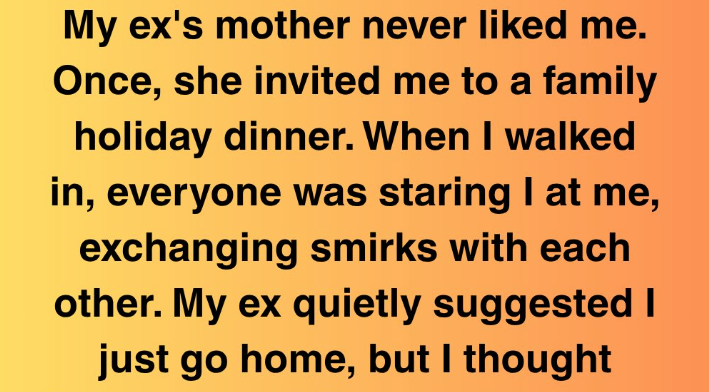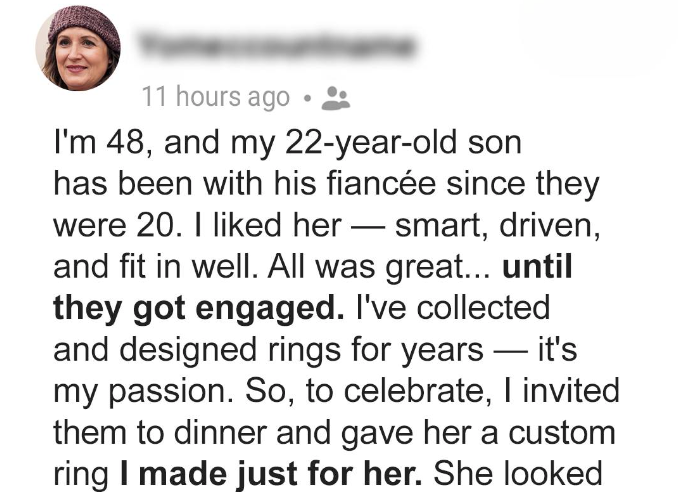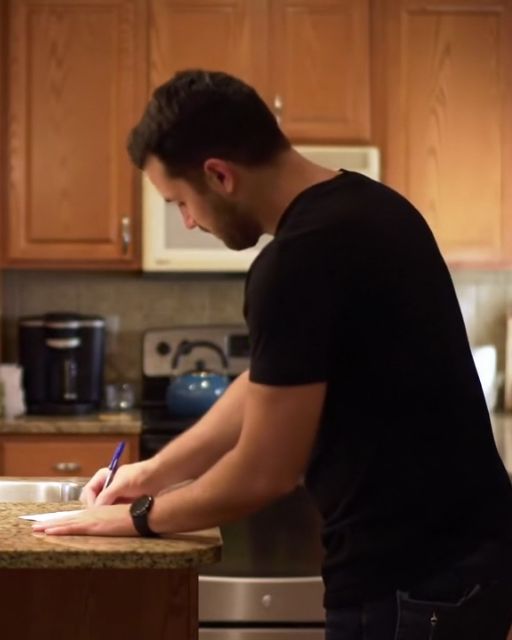Derik’s mother always seemed to disapprove of me. One year, she extended an invitation to their family holiday gathering. As I entered, I noticed the room filled with glances and subtle grins exchanged among the guests. Derik quietly leaned in and suggested I might want to leave, but I felt staying was the polite thing to do. Then, his mother approached with a long, peculiarly shaped box, presenting it to me with an odd smile. “This is for you, dear,” she said. When I opened it, a chill ran through me. Nestled inside was an industrial-grade toilet brush, the kind you’d find in a gas station restroom.
At first, I couldn’t even identify it. The box was adorned with delicate floral wrapping and a ribbon, which somehow made the reveal more jarring. Once it clicked, I blinked rapidly and scanned the room. Derik’s older sister stifled a laugh behind her wine glass. Someone on the nearby sofa let out a single clap.
I turned to Derik, hoping for support, but he offered only a half-hearted shrug, caught somewhere between discomfort and amusement. “Is this supposed to be funny?” I asked. His mother replied, “We thought, since you’re so particular about cleanliness, this might suit you perfectly!” She stretched the word “particular” in a way that felt like a jab.
I stood there, clutching that humiliating gift, feeling utterly paralyzed. I’d spent all morning baking pies, selected a nice bottle of wine, and dressed carefully, knowing how strained things were with his family. Derik and I had been together nearly a year by then, yet his mother never made me feel welcome. This, though, was a new level of cruelty.
I set the box on the coffee table and mumbled, “I think I’ll head out.” No one, not even Derik, tried to stop me. Driving home, my throat tightened so much I could hardly breathe. Yet, foolishly, I didn’t end things with him then.
The worst part? Derik didn’t see the issue. He called me overly sensitive, saying I couldn’t handle a prank. I tried to explain how degrading it felt, how it wasn’t about the brush but about being mocked and ostracized. He sighed, saying, “That’s simply how my mom is.”
I stayed with him for another five months. Five. During that time, I went out of my way to win his mother’s approval, despite her clear disdain. I planned her 60th birthday celebration, drove her to dental visits, and even crafted a detailed photo album of Derik’s childhood for Mother’s Day.
Her response? A laugh and, “Well, this beats a toilet brush, I guess!”
Derik chuckled too. That was my breaking point.
That night, I ended it. I wish I could say I left with dramatic flair, but it was far from cinematic. I cried, packed my things quietly while he watched TV, and left.
I relocated to a small studio across town, started therapy, and vowed never to diminish myself to fit someone else’s warped expectations again.
Two years later, I’d carved out a decent life. I launched a pet-sitting business, joined a yoga group, and adopted a cranky cat named Beanie who adored only me. My dating life was nonexistent, but I was content.
One day, while restocking a dog treat bin at a client’s vet clinic, a familiar voice interrupted me.
“Excuse me, are you the pet sitter?”
It was Derik’s mother.
I turned slowly, almost dramatically. There she stood, her hair grayer, holding a shaky, diapered Pomeranian.
For a moment, I thought she didn’t recognize me. Then she tilted her head and said, “Oh. It’s you.”
I kept my composure, smiled, and offered to walk her dog if she needed help. She eyed my worn sneakers and cat-hair-covered leggings, then asked, “You’re still doing… side gigs?”
Side gigs. As if my thriving business was some trivial hobby. I smiled and said, “Yup, keeps things running.”
She mentioned her regular sitter had moved and, hesitantly, asked if I could take on her dog. Against my instincts, I agreed.
For the next four months, I walked her Pomeranian, Muffin, three times a week.
It was odd. She never apologized or acknowledged the brush incident or her past coldness. But gradually, she began to soften.
One morning, I found her on her porch with a steaming mug of tea. “Want one?” she asked, avoiding my gaze.
I accepted.
We sat quietly at first, sipping tea and watching Muffin chase leaves. Then she said, “Derik’s in Phoenix now. Dating a Pilates instructor who’s always on Instagram.”
I nodded, refusing to show any reaction.
But then she added, “He always goes for the shiny ones. Never learned to value someone real.”
Her words caught me off guard.
I didn’t respond, just petted Muffin and said I had another client. But her comment lingered.
Weeks later, she asked for help setting up an online grocery order, then with her tablet. Once, she even offered me soup. It was as if she was starting to see me differently—and maybe that wasn’t a bad thing.
Then came a turning point.
In late March, she called, sobbing. Muffin had collapsed. I rushed over, drove them to the emergency vet, where we learned Muffin had congestive heart failure. We held her as she passed.
She gripped my hand tightly the whole time.
Afterward, with teary eyes, she said, “I was horrible to you.”
I was speechless.
She continued, “When Derik brought you home, I thought you weren’t good enough. I wanted someone more refined for him. But I was wrong. You had depth.”
I wanted to say, “You’re damn right,” but I just handed her a tissue and nodded.
In the months that followed, she invited me over more often. I helped clear out Muffin’s belongings. Sometimes, I brought Beanie, who predictably despised her.
We developed something like a cautious friendship—not quite family, but warm.
Then came the full-circle moment.
That Christmas, she gave me a small box, handing it over nervously. I opened it and burst out laughing. It was a tiny porcelain toilet, stuffed with about $300 in cash and a note: For all the nonsense I put you through. Sorry.
I laughed so hard I had to sit down.
That gift mended something I didn’t realize still hurt.
She’s in a retirement village now. I visit monthly. We play cards, sip weak tea, and grumble about pet food prices.
Derik called once, suggesting a meetup while he was in town. I said I was busy. Didn’t hesitate.
Time is strange. People who hurt you can surprise you, and those you loved can let you down in ways you never imagined.
I don’t hold grudges anymore. Life’s too unpredictable for that. But I do set boundaries, and that’s made all the difference.
If there’s one thing I’ve learned, it’s this: you don’t need to prove your value to anyone—not your partner, their family, or anyone else. The right people will see you for who you are.
If this story resonates, share it with someone who’s faced a similar “brush-off” or drop a to show you get it.




